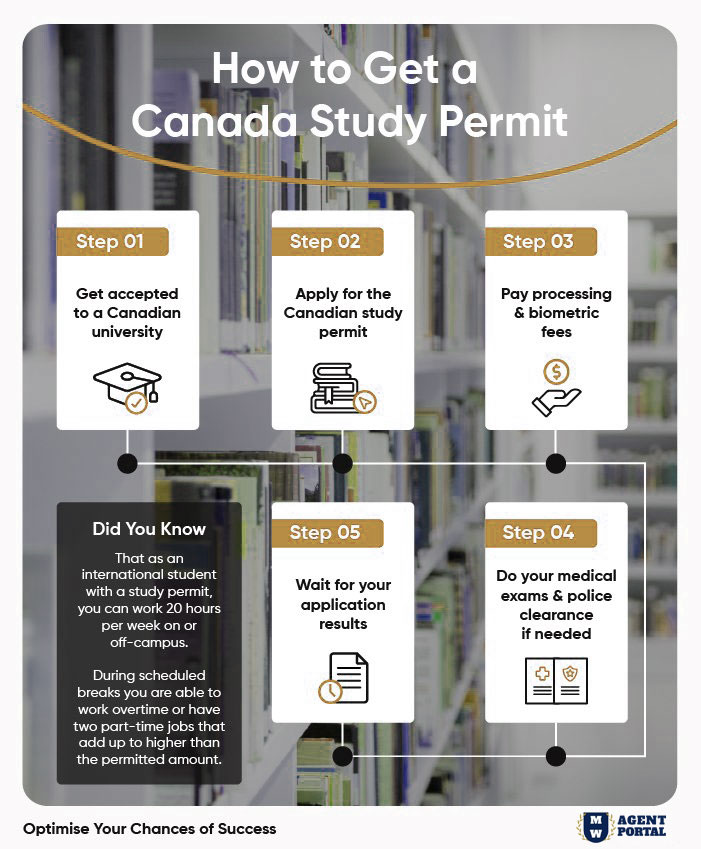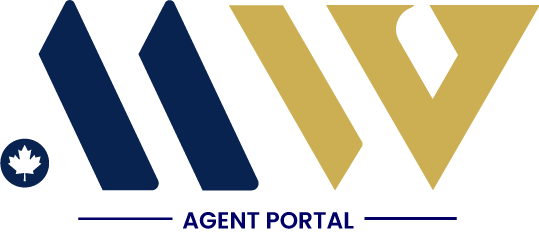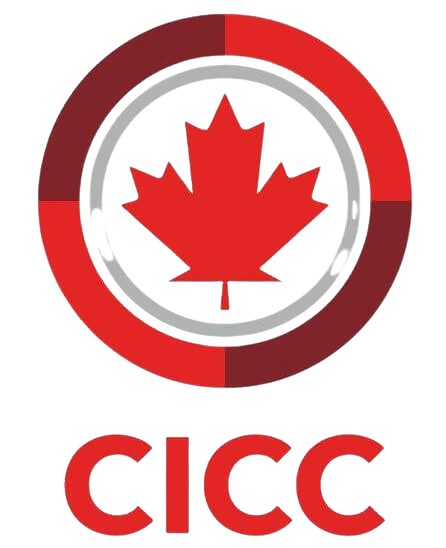How to Get a Canada Study Permit
If you’re looking to be an international student, choose Canada! For one, Canada is the most educated country in the world with more than half of the students completing their education. If that’s not enough reason to choose Canada as a study destination, it’s also affordable compared to that of the U.S., and U.K.
With an estimate of over 130,000 international students every year, you can be one too. Learn how to get a Canada study permit and be well on your way to a brighter future.
How Do I Get a Study Visa?
 If you’re planning to study in Canada as an international student, then you must have a study permit. Below are the steps to obtain a study visa. 1. Get accepted to a Canadian university Before applying for the permit, the first thing you’ll need to do is be enrolled at a Designated Learning Institution (DLI). Since the pandemic, there has been a slight change and the university you apply to needs to be on the list of DLI with an approved COVID-19 readiness plan. But not to worry as there are many affordable tertiary institutions in Canada to choose from. 2. Apply for the Canadian study permit The following documents are needed to apply:
If you’re planning to study in Canada as an international student, then you must have a study permit. Below are the steps to obtain a study visa. 1. Get accepted to a Canadian university Before applying for the permit, the first thing you’ll need to do is be enrolled at a Designated Learning Institution (DLI). Since the pandemic, there has been a slight change and the university you apply to needs to be on the list of DLI with an approved COVID-19 readiness plan. But not to worry as there are many affordable tertiary institutions in Canada to choose from. 2. Apply for the Canadian study permit The following documents are needed to apply:
- an acceptance letter from a Designated Learning Institution (DLI);
- a valid passport or travel document and;
- proof you can finance yourself and any family members who go with you, while in Canada.
Depending on your country of origin, you may need additional documents such as:
- a letter of explanation;
- a certificat d’acceptation du Québec (CAQ);
- a custodian declaration, if you’re a minor; and
- any other documents you may need.
You have two choices when applying, you can either apply online or via a paper application. However, it is advised to apply online and it’s much quicker and easier. It’ll also ensure that your application is completed correctly before submitting and your application result will be sent directly to your online account. 3. Pay processing and biometric fees  Be mindful of the processing fees you’ll need to pay, this includes for yourself and anyone else on your application. You’ll also have to pay the biometrics fee. All fees are paid at the end of your application.
Be mindful of the processing fees you’ll need to pay, this includes for yourself and anyone else on your application. You’ll also have to pay the biometrics fee. All fees are paid at the end of your application.
| Canadian Study Permit Fees | |
|---|---|
| Fee | Amount in CAD |
| Study permit (including extensions) – per person | $150 |
| Restore status ($200) + new study permit ($150) | $350 |
| Biometrics – per person | $85 |
| Biometrics – Maximum fee for a family of 2 or more people applying at the same time and place | $170 |
| Electronic Travel Authorization (eTA) | $7 |
Please note that the study permit is not a visa. If needed, you’ll get an eTA issued along with your study permit. 4. Do your medical exams and police clearance if needed Any foreign national planning to stay in Canada for longer than six months needs to have a medical examination done to enter Canada. This is to make sure you’re not prohibited for medical reasons. For this medical exam you can’t go to your general doctor, it needs to be an approved panel physician in your country.
You can either do the medical exam before submitting your application or after. In the case it’s the latter, the Immigration Refugees and Citizenship Canada (IRCC) will send you instructions on how to get your medicals done. You must go for your medical exam within 30 days of receiving these instructions. Your application may be refused if you don’t follow the instructions. 5. Wait for your application results The processing times can vary depending on the country you’re applying from. Applicants will generally have a waiting time of 16 weeks to get a Canada study permit, however, applicants from countries participating in the Student Direct Stream can expect shorter waiting times of approximately 20 calendar days.
What is the Student Direct Stream?
The Student Direct Stream (SDS) is designed to improve the economic, cultural and social benefits international students bring to Canada, by expediting the processing time of study permits.
To be eligible for the Student Direct Stream, you must be a legal resident living in one of the following countries:
- Antigua and Barbuda;
- Brazil;
- China;
- Colombia;
- Costa Rica;
- India;
- Morocco;
- Pakistan;
- Peru;
- Philippines;
- Senegal;
- Saint Vincent and the Grenadines;
- Trinidad and Tobago;
- Vietnam.
Most SDS applications take 20 calendar days to be processed, however, certain applications may take slightly longer, depending on the applicant.
Who can apply for a Canadian study visa?
 You can apply for a study visa for Canada if:
You can apply for a study visa for Canada if:
- are enrolled at a DLI;
- prove you have enough money to pay for your tuition, living expenses and return transportation for yourself and your family;
- obey the law, have no criminal record and get a police certificate, if required;
- are in good health and get a medical exam, if required; and
- prove to an officer that you will leave Canada when your study permit expires.
The Benefits of Using Professionals for Your Visa
Canadian study permits are in high demand and rejected applications are common. So you want to do your best to ensure that you have done everything correctly in order to stay clear of the rejection pile.
As a client of mwagents.ca, you’ll have expert Regulated Canadian Immigration Consultants (RCICs) working on your visa application. The RCICs we work with will inform you of the exact documents that are required from you and ensure that your application is submitted in time. With professionals handling your application you can be certain there won’t be any mistakes which increases your chances of a successful application.
You’ll have 24-hour support, so if you have any questions, just ask. You’ll have a dedicated case agent and RCIC at your disposal.
Now that you’re aware of how to get a Canada study permit, all you need to do is check if you’re eligible.
Immigration FAQ’s
Your Comprehensive Ranking System (CRS) is based on the following factors:
- Provincial Nomination;
- Offer of employment;
- Core capital factors;
- Your common-law partner or spouse;
- Skill transferability;
- Previous Canadian study experience;
- Siblings in Canada; and
- French and English Ability
Provincial Nomination (600 Points)
600 points are awarded for an enhanced Nominee certificate from a province in Canada through the Provincial Nominee Program (PNP).
Job Offers (50-600 Points)
A Canadian job offer will also earn you points; the number of points is based on the NOC level of the particular job.
Core Human Capital Factors (600 Points)
These take into account your level of education, for example:
- Certificate;
- Diploma; or
- Degree
If you intend to gain higher qualifications, your score will increase. This same point system applies to your legal partner or spouse if you applied together.
Language (150 Points)
Improving your language skills in either English or French through a recognized Canadian institution can also raise your CRS score.
Work Experience
The more experience you have, the more points you earn. This also applies to your legal partner or spouse.
You must:
- Meet all the requirements of the:
- Federal Skilled Worker Class (FSWC);
- Federal Skilled Trades Class; or
- Canadian Experience Class
You must register with the Canadian Job Bank within 30 days unless:
- You have arranged employment from a Canadian employer; or
- You have received a nomination through the Provincial Nominee Program
You must have a Labour Market Impact Assessment in order to earn Comprehensive Ranking System points, unless you:
- Have worked full time for an employer with a work permit for a least one year (or a part-time job for an equal amount of time);
- Have a valid job offer from a Canadian employer that is for at least one year in duration; or
- Have a valid employer specific temporary work permit exempt under code R204 (a), (c) or R205
If you qualify for any of the Federal Programs, you have 30 days from when you submit your profile to complete the rest of the requirements like registering with the Job Bank. If you do not, your Express Entry profile cannot be activated.
There are three programs to apply for under Express Entry:
- Skilled Federal Worker Program (SFWP);
- Skilled Federal Trades Program (SFTP); or
- Canadian Experience Class (CEC)
The following factors affect your eligibility:
Work Experience
You must:
- Have gained relevant work experience for a job listed in the National Occupation Classification (NOC). Note: Work experience gained in another occupation you have not applied for does not apply;
- Have gained work experience in the past 10 years;
- Have received payment for your work;
- Have a job at skill level 0, A or B;
- Have a year’s worth of work experience (minimum 1,560 hours); and
- Prove that your work experience fits the requirements of the NOC
Language Ability
You must:
- Meet the minimum language level set by the Canadian Language Benchmark (CLB);
- Take a language proficiency test That is approved by IRCC;
- You must meet the language requirements for either French or English; and
- Your language test results must not be more than two years old when you apply
Education
You must:
- Have completed canadian secondary education; and a tertiary certificate, diploma or degree;
- Have completed foreign credentials; or
- Have an Educational Credential Assessment (ECA) approved by IRCC
Proof of Funds
You must prove you can support yourself and your family financially, unless:
- You are working in Canada; or
- You have a valid job offer from a Canadian employer
Additional Factors to Be Considered
- Age;
- Valid job offers; and
- Adaptability
This program is aimed at people who wish to become permanent residents (PR) of Canada. This only applies to people who qualify in a skilled trade.
Minimum Requirements
You must:
- Plan to live outside of Quebec (The province has its own Quebec Skilled Worker Program);
- Meet the language requirements for English and French;
- Have two years’ work experience in a skilled trade (or equal amount of experience in a part time position;
- Have work experience within the past 5 years;
- Meet the job requirements in the National Occupational Classifications;
- Have a full-time job offer from a Canadian employer for a minimum of one year; or
- A certificate of qualification for that skilled trade that is confirmed from the Canadian provincial or territorial government authority
Skilled Work Experience
These skilled trades are involved in the Federal Skilled Trades Program as ranked by the National Occupational Classification.
| Group Number | Job Description |
|---|---|
| 72 | Industrial, construction or electrical trades |
| 73 | Equipment operation and maintenance |
| 82 | Technical and supervisors in:
|
| 92 | Processing, manufacturing and utilities supervisor Central control operators |
| 632 | Cooks and chefs |
| 633 | Bakers and butchers |
Education
You do not need a specific qualification for this program, but you can earn more CRS points if you have:
- Foreign qualifications;
- An Educational Credential Assessment (ECA) approved by IRCC;or
- A Canadian certificate, diploma or degree
Language Ability
- Pass the Canadian Language Benchmark test at minimum language level;
- The language test must be approved by IRCC; and
- Your test results must not be older than two years when you apply.
Be assessed by the province or territory
Each of the provinces or territories have different requirements for the skilled trade industry.
Minimum Requirements
Minimum Requirements
You must:
- Have skilled work experience for at least 12 months (either full time or part time for the same amount of time) within three years before you apply;
- Have the required language skills needed for your job;
- Have gained experience in Canada with proper authorization;
- Have the language proficiency needed for your job; and
- Have plans to live outside of Quebec
Skilled Work Experience
Work experience must be gained in the following job levels based on the National Occupational Classifications.
| Job Description | Skill Type |
|---|---|
| Technical jobs | B |
| Skilled trades | B |
| Professional jobs | A |
| Managerial jobs | 0 |
Education
You do not need an education to apply for this program, but you can score higher if you:
- Have a high school diploma, tertiary diploma or degree;
- Have an Educational Credential Assessment (ECA) approved by IRCC; or
- Have completed foreign credentials
Language Ability
To qualify you must score well in the various language tests determined by the CEC.
| Canadian Language Benchmark Score Needed | Job Level (NOC) |
|---|---|
| 7 | 0 |
| 7 | A |
| 5 | B |
The language test must be approved by IRCC and must not be older than two years when you apply.
- Have skilled work experience for at least 12 months (either full time or part time for the same amount of time) within three years before you apply;
- Have the required language skills needed for your job;
- Have gained experience in Canada with proper authorization;
- Have language levels need for your job; and
- Have plans to live outside of Quebec
Note:work experience gained as a student or a self-employed individual does not count.
Skilled Work Experience
Work experience must be within three years of applying for the Canadian Experience Class. Work experience must be gained in the following job levels as based on National Occupational Classifications.
| Job description | Skill Type |
|---|---|
| Technical jobs | B |
| Skilled trades | B |
| Professional jobs | A |
| Managerial jobs | 0 |
Education
You do not need an education to apply for this program, but you can score higher if:
- have a high school diploma and/or tertiary diploma or degree;
- have an Educational Credential Assessment (ECA) approved by Immigration, Refugees and Citizenship Canada; or have
- completed foreign credentials
Note: Only apply for an Educational Credential Assessment (ECA) if your foreign education is either equal to, or higher than the Canadian education standard.
Language Ability
To qualify you must score well in:
- the Canadian Language Benchmark; and
- the language tests
| Canadian Language Benchmark score needed | Job level (NOC) |
|---|---|
| 7 | 0 |
| 7 | A |
| 5 | B |
The Language Test must be approved by the Immigration, Refugees and Citizenship Canada .These tests are based off your French and English ability to:
- Read;
- Speak;
- Listen; and
- Write
Your test results must be included if you are applying for this program through the Express Entry program. Note: these tests must not be older than two years when you apply.
Principal Applicant
When you apply for the Express Entry, and want to immigrate with your common law partner, you must choose who will be the principal applicant.
Note: a common law partner is a person who has been married to you for one year. This applies for same sex and opposite sex partners.
Choose the principal applicant by looking at who will score the highest points under the Express Entry program.
Inadmissibility
You may be inadmissible if you are:
- Considered a security risk;
- Lied about information in your application or interview;
- Have ties to organised crime;
- Can’t support yourself financially;
- Have terrible financial health;
- Committed a crime outside of Canada;
- Do not qualify under Canada’s immigration laws; and
- Have a family member that is not allowed in the country
Choosing Where To Live
Note:under the Express Entry you can apply to live in other provinces/territories in Canada, except Quebec. This province has its own set of requirements needed for you to enter.
These are the factors that are used to calculate CRS Points
- Age (max 110 points);
- Education (max 150 points);
- Language proficiency (max 160 points);
- Canadian Work Experience (max 80 points);
- Skills Transferability (max 100 points); and
- Additional Factors (max 600 points)
A legal agent is an authorized representative that must be:
- A paralegal or lawyer who has a good relationship with the provincial or territorial legal societies of Canada;
- A Regulated Canadian Immigration Consultant (RCIC) who has a good relationship with the Immigration Consultants of Canada Regulatory Council; or
- A notary who has a good relationship with the Chambre des notaires du Québec
Note: An unauthorized agent will not be able to help you with your application.
If you want to ensure that your Registered Canadian Immigration Consultant (RCIC) is an authorized consultant, you can check with the Immigration Consultants of Canada Regulatory Council (ICCRC).
The ICCRC’s website has a register of all the persons that are qualified to be Canadian Immigration Consultants. Any individual who claims to be a legal consultant will have a RCIC code. If there are no results for a person’s RCIC code, then they are not a legal Canadian Immigration Consultant.





